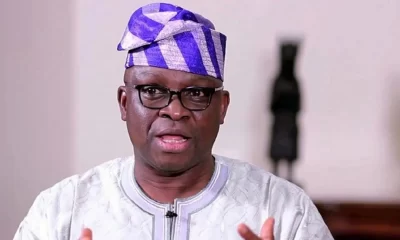Nigeria News
Sitting Judges Cannot Face Trial – Appeal Court Tells EFCC

-Appeal court rules against EFCC’s decision to drag serving judges to court for actions in the course of discharge of duties.
-The court ruling maintained such judicial officers must first be relieved of their duties by the EFCC before they can be prosecuted.
-EFCC has however, vowed to take the matter to the supreme court for determination.

Court stops EFCC from prosecuting serving judicial officers.
A court of appeal, sitting in Lagos state, yesterday ruled that the Economic and Financial Crimes Commission (EFCC) is not empowered by law to investigate or prosecute serving judicial officers except where such officers have first been dismissed or retired by the National Judicial Council (NJC).
The court judgment is anchored on the principle of separation of powers between the three arms of government in Nigeria.
The court judgement, further held that a serving judicial officer can only be prosecuted for offences like murder, stealing and others, if such offences are not committed in the course of discharging their official duties.
The court handed down the judgement while ruling in the appeal by justice Hyeladzira Nganjiwa, challenging the jurisdiction of the lower court to try him as a sitting judge.
The appellate court held that once the offence is allegedly committed in the discharge of their duties, they must first be tried by the NJC and dismissed or retired before they can be investigated or prosecuted by the EFCC.
Justice Nganjiwa, had been arraigned by the EFCC for allegedly receiving $260,000 and N8.65 million gratifications to enrich himself as a public official. Allowing the appeal against a decision of the Lagos High Court, Justice Obaseki Adejumo, who delivered the lead judgment held that the condition precedent to filing of Charge No: LD/4769/2017 by EFCC had not been fulfilled.
In his judgement, the NJC must first strip or remove the judicial officer of his judicial standing before he could be charged with such alleged offence allegedly committed in the course of discharge of his duties.
The court therefore held that the High Court of Lagos State lacks the jurisdiction to hear and determine the charge against the serving judicial officer.
The Court of Appeal accordingly set aside the ruling of the Lagos High Court and upheld the preliminary objection filed by the defendant at the lower court.
Meanwhile, the EFCC, through its spokesperson, Wilson Uwujaren, has vowed to appeal the judgement, describing the ruling as a “dangerous precedent.”
“The EFCC is to appeal against the ruling of the Lagos Division of the Court of Appeal, which today held that the agency lacked powers to investigate or prosecute serving judicial officials except where such officers have been dismissed by the National Judicial Council.
“The Commission considers the ruling a dangerous precedent that has no basis in law and, is confident that the Supreme Court will upturn the judgment.
“Criminal trial takes precedence over administrative procedures and it is strange that the Court of Appeal wants to put the cart before the horse. This is ridiculous! The appellate court simply wants to confer immunity on public officers from prosecution for corruption, it will not stand,” Mr. Uwujaren said.












